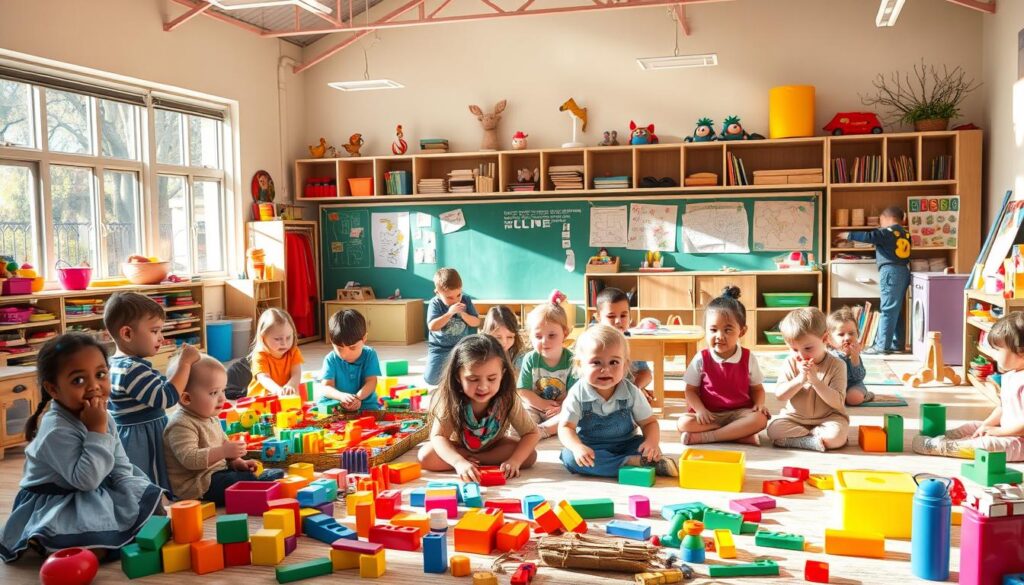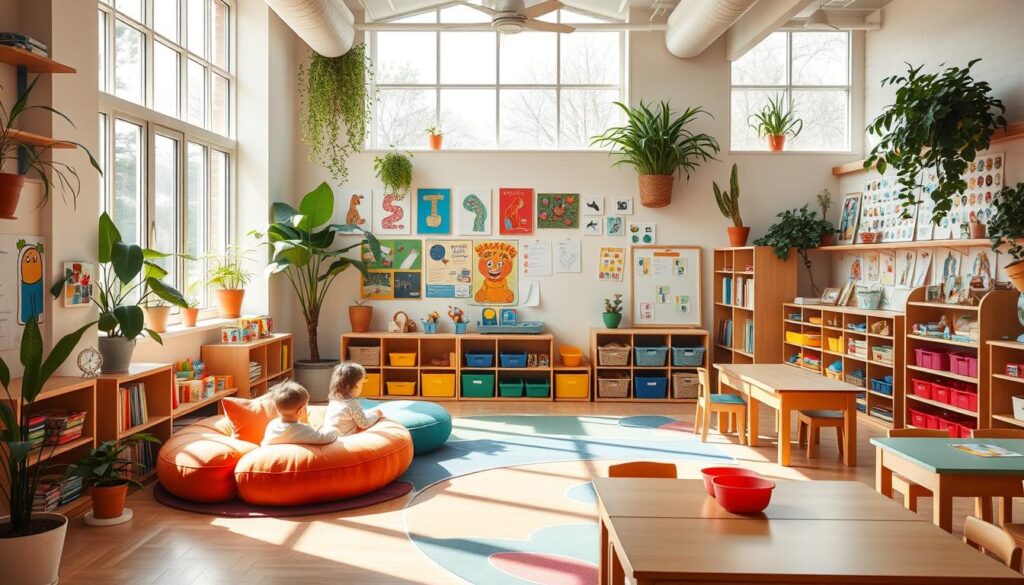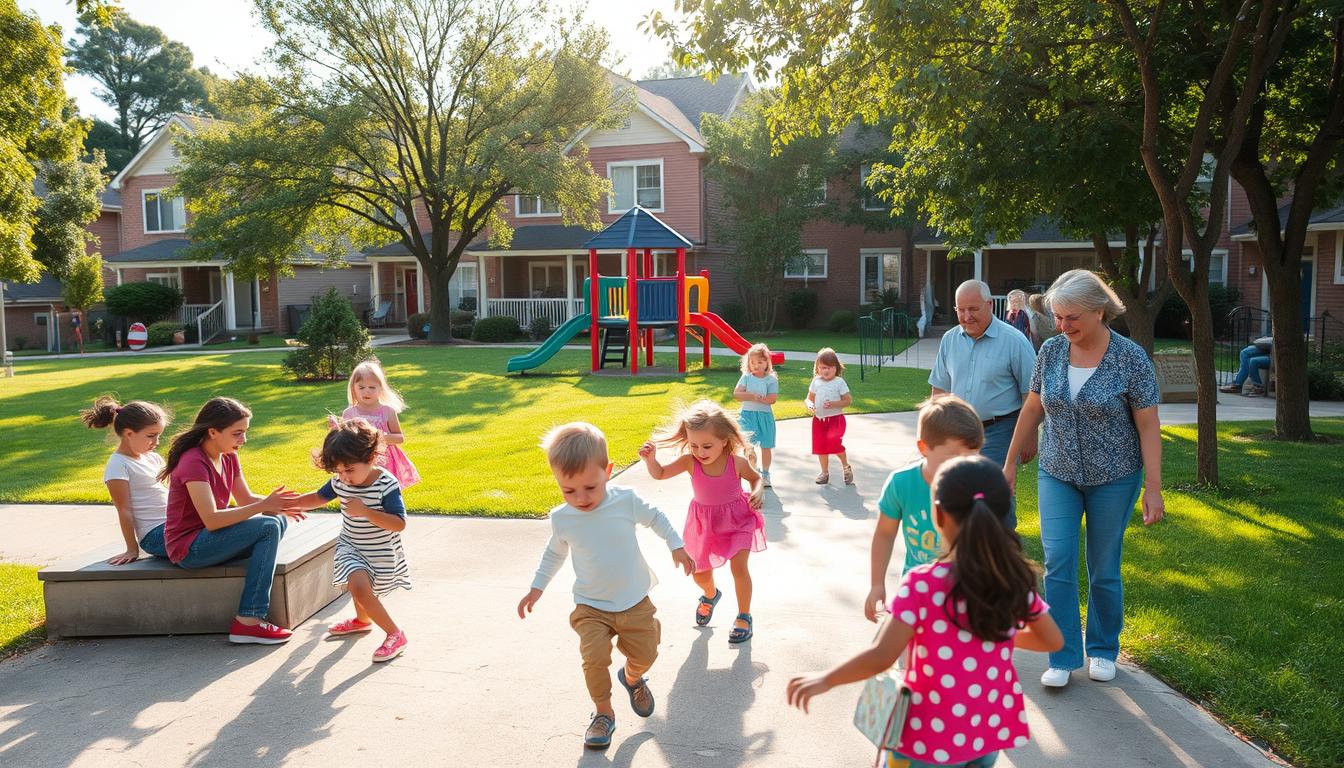I’m excited to dive into how early childhood education shapes our brains. From a young age, our brains soak up knowledge and experiences. These early years set the stage for our future thinking abilities.
The right learning environment can greatly shape our brain’s development. It influences how our brain’s pathways form and grow. This is key for our cognitive skills to develop.
I find the science of brain growth and early learning fascinating. Studies show that the early years are vital for brain expansion and flexibility. Quality education during this time boosts cognitive development in amazing ways.
Key Takeaways
- Early childhood education plays a key role in brain development and cognitive growth.
- The first few years are critical for rapid brain growth and neural plasticity.
- Quality educational programs in early years can deeply impact neural pathways and cognitive abilities.
- Investing in early learning sets the stage for future academic success and lifelong learning.
- Understanding brain development can help create effective educational strategies and interventions.
Understanding Neural Plasticity in Early Years
Exploring early childhood development reveals a key concept: neural plasticity. This amazing ability of the young brain to adapt and grow is essential for learning.
Critical Periods for Brain Development
In early childhood, the brain changes a lot. This is when it’s most open to new experiences. Knowing these times helps us make learning better.
How Synaptic Connections Form in Young Minds
Neural plasticity is all about how brain cells talk to each other. In young brains, this happens fast, thanks to experiences and interactions. It lays the groundwork for learning later on.
Window of Opportunity for Learning
The early years are key for learning. The brain is very open to new things then. Good education during this time can help a lot.
“The most important period of brain development is the first few years of life, when the brain is forming the basic architecture that will support all future learning, behavior, and health.” – Center on the Developing Child, Harvard University
The Impact of Early Childhood Education on Brain Development
Early childhood education is key in shaping young minds. Studies show it has lasting benefits for brain development and learning. Quality early learning experiences shape a child’s brain in many ways.
Early education boosts language and communication skills. Activities like interactive stories and phonics help strengthen brain pathways. This makes it easier for kids to understand and speak language.
It also helps with social and emotional skills. Through play and learning to manage feelings, kids develop important brain functions. These skills are vital for future success and happiness.
Early education also grows the brain’s thinking areas. A stimulating environment in early years helps create new brain connections. This boosts thinking and problem-solving abilities.
| Key Aspects of Early Childhood Education | Impact on Brain Development |
|---|---|
| Language and Communication Skills | Strengthens neural pathways responsible for language processing and verbal expression |
| Social-Emotional Skills | Contributes to the development of executive function and impulse control |
| Cognitive Stimulation | Promotes the growth of the prefrontal cortex and enhances higher-order thinking |
The benefits of early education on brain development are clear. Kids in quality programs do better in school and life. They have better social skills and thinking abilities.
“Early childhood education lays the foundation for a child’s lifelong learning and development. The investment we make in our children’s early years pays dividends in their future success and well-being.”
Understanding early education’s impact on brain development is important. It shows why we need to give all kids great learning environments early on.
Role of Play-Based Learning in Cognitive Growth
In early childhood education, play-based learning is key. It helps young minds grow through fun and structured play. This approach unlocks children’s full learning and success possibilities.
Benefits of Structured Play Activities
Activities like building blocks and puzzles are not just fun. They also boost problem-solving and thinking skills. These play activities help children’s brains grow, preparing them for the future.
Social Interaction and Brain Development
Playtime is also vital for social skills. It helps children learn to work together and understand each other. This builds important skills like empathy and emotional intelligence, helping their brains grow.
Creative Expression and Neural Pathways
Play lets children show their creativity. Through stories, art, or music, they build their brains. This creativity sparks their thinking and problem-solving abilities for life.

Creating Nurturing Educational Environments
Creating nurturing environments is key for young children’s brain growth. Good childhood education programs do more than teach. They make a safe space for kids to explore, be creative, and interact with others. This helps kids grow smart and emotionally strong.
At the center of these environments are caring, skilled teachers. They know how to help young minds grow. They use fun activities and group work to boost learning and love for learning.
These environments also have great materials and curricula for kids. Kids get to play with blocks, solve puzzles, and read stories. This sparks their curiosity and helps them connect ideas. Teachers make sure each child learns at their own pace.
The best learning places focus on both feelings and learning. They make kids feel safe and valued. This lets kids try new things, share their thoughts, and make friends. It prepares them for a lifetime of learning and happiness.
“The first five years have so much to do with how the next 80 turn out.” – Bill Gates

Creating great learning spaces for kids is very important. With caring teachers, fun materials, and a supportive vibe, we can help kids reach their highest levels. This sets them up for success in life.
Measuring Cognitive Development Through Early Education Programs
It’s important to see how early childhood education affects brain growth. We use different ways to check how well young kids are learning. These methods help us see how their brains are developing.
Assessment Methods and Milestones
There are many ways to check how kids are doing in school. We use tests, watch how they act, and look at their work. These help us see if they’re getting better at talking, solving problems, and getting along with others.
Long-term Benefits of Early Intervention
Studies show that good early education really helps kids grow. Kids who go to these programs do better in school and life. They learn to talk better, remember things, and make good choices.
Research-Based Success Indicators
- Improved academic performance and test scores
- Higher rates of high school graduation and college attendance
- Reduced risk of behavioral issues and social problems
- Increased earning power and economic stability as adults
| Developmental Milestone | Average Age | Early Intervention Impact |
|---|---|---|
| Language Development | 12-24 months | Improved vocabulary, grammar, and communication skills |
| Problem-Solving Skills | 24-36 months | Enhanced critical thinking, reasoning, and decision-making abilities |
| Social-Emotional Competence | 36-48 months | Stronger self-regulation, empathy, and interpersonal skills |
Early education programs can really see how kids are growing. They use tests and watch how kids act. This shows how early help can really help kids in the long run.

Conclusion
Early childhood education is key in shaping young minds. The brain’s ability to change and adapt in early years is amazing. It sets the stage for future learning and success.
I’ve talked about how the brain develops and how learning happens. Quality early education programs are important. They use play to help kids grow socially, creatively, and cognitively.
Investing in early education benefits not just the child but society as a whole. It helps young learners become problem-solvers, leaders, and engaged citizens. They can make a positive impact on their communities and the world.



